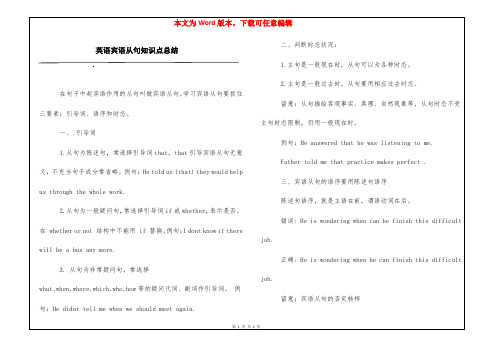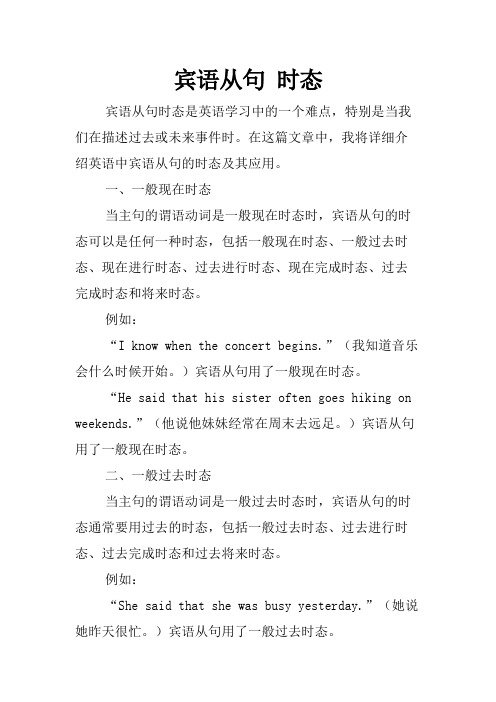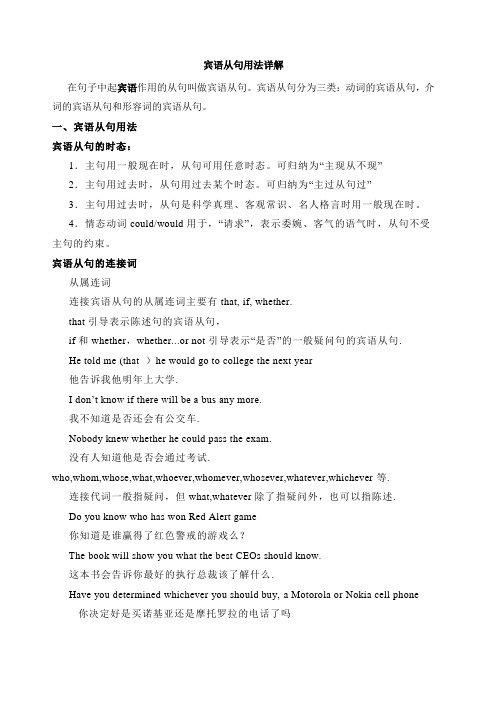时态.宾语从句 归纳
[宾语从句的时态及语序] 宾语从句的语序和时态
![[宾语从句的时态及语序] 宾语从句的语序和时态](https://img.taocdn.com/s3/m/34c7897d9e31433238689347.png)
[宾语从句的时态及语序] 宾语从句的语序和时态宾语从句的时态及语序一.主句与从句时态一致问题(中考考点)1. 如果主句是现在的某种时态(包括一般现在时,现在进行时,现在完成时),那么宾语从句的时态课根据实际情况而定。
eg. I remember he gave me a book yesterday.2. 如果主句是过去的某种时态(包括一般过去时,过去进行时),那么宾语从句一般要用过去的某种时态(包括一般过去时,过去进行时,过去将来时,过去完成时)Eg.He told me that he would take part in the high jump.3. 但当宾语从句是指客观事实、普遍真理、自然现象时,则只能用一般现在时。
eg. She said (that) the sun rises in the east.三.宾语从句的语序(中考考点)宾语从句要用陈述句语序(中):—Do you know _D__ tomorrow?A. when did she comeB. when she cameC. when will she comeD.when she will comeA组习题1. — Do you know ____ tomorrow?—At 8 o”clock.A. when did she comeB. when she cameC. when will she comeD. when she will come2.We want to know _____to help them.A. what can we doB. what we can doC. how can we doD. how we can do3.1 didn”t see Laura at the party last night. Do you know_?A. why didn”t she comeB. what happenedC. when would she arriveD. where she has been4.— Excuse me, I want to go to the 21st National Book Expo (世博会). Could you tell me______?— Sure. It is at No. 3 Changjiang Road in Harbin.A. where it isB. where it wasC. where is it5. ----Could you tell us how long ?---- About three days.A. does the sports meeting lastB. the sports meeting will lastC. the sports meeting lastD. will the sports meeting last6.— Could you please tell me ?—Tomorrow morning.A. how I can get to the post officeB. how long can I keep the bookC. when to leave for BeijingD. where I should take the early bus7.—Do you know ___ Beijing with his family?—Next week.A. when Mr Zhao will visitB. when will Mr Zhao will visitC. when Mr Zhao visited8.Can you tell me_ ?A. where you are fromB. where you are fromC. where do you come from9. Do you know ___________?A. when will he be backB. when he will be backC. where did he goD. where will he go10.Allen wanted to know ____ after it got out of the UFO.A. what is the alien doingB. what the alien would doC. where would the alien goD. where the alien is going11.—Could you tell me ________ the party?—Next Friday.A. where we are going to haveB. when we are going to haveC. when we were going to have12.—I’m new here. Could you please tell me _______?—Sure. It’s over there behind that tower.A. where the youth centre isB. when the lipary opensC. how far is the amusement parkD. how can I get to the underground station13.I don”t know if she to my birthday party tomorrow. If she , I”ll be very happy.A. comes; comesB. will come; comesC. comes; will come14.—I don”t know_ .— You can go and ask Jack.A. when does the train leaveB. that we will plant trees or notC. if she had come yesterdayD. what I should buy for him15.—Mum, can we go to the art museum tomorrow?—Sure. But first we should find out ________.A. what can we doB. where we can goC. how can we go thereD. if it will be openB 组习题1.—Could you tell me _________?— You can take No. 16 bus.A. how can we get to the Olympic ParkB. how we can get to the Olympic ParkC. how did we get to the Olympic ParkD. how we got to the Olympic Park2.—Can you tell me how many colors ________ in a rainbow?—Seven.A. there areB. are thereC. they areD. are they3.—Could you tell me ?—He”s a bank clerk.A. who your father isB. what your father doesC. where your father works。
宾语从句考点归纳

宾语从句宾语从句考查的重点是引导词、时态和语序,其结构为:…动词+ 引导词+ 宾语从句【1】引导词(1)that 引导陈述句作宾语从句有时可省略。
(2)if "是否"引导一般问句作宾语从句whether "是否"引导一般问句或选择问句作宾语从句(3)疑问词引导特殊问句作宾语从句。
【2】语序:一律为陈述句语序。
陈述句语序;是be/助/情在主语之后或没有be/助/情疑问句语序;是be/助/情在主语之前。
【3】时态:(1)主句是一般现在时或祈使句,宾语从句根据需要选用任何时态。
(2)主句是一般过去时,宾语从句只能用过去时态。
即:一般过去时(过去式V-ed)过去进行时(was/were + V-ing)过去将来时(would + V原/was/were going to + V原)过去完成时(had + 过去分词)(3)从句表示的是客观事实、普遍真理、自然现象时,从句的时态一律使用一般现在时。
宾语从句的其它考点1. whether与if 用法区别2. 宾语从句的否定转移3. 宾语从句的变换疑问词+ to do sth./ to do sth.高频考点一:宾语从句的引导词①宾语从句是陈述句,引导词用that,在口语中that可以省略。
eg: We believe(that) he is honest.我们相信他是诚实的②如果宾语从句由一般疑问句转换而来,其引导词用if或whether。
一般情况下,二者可以通用,但要注意只能用whether的情况。
例: I’ve no idea if/ whether she will come here. 我不知道她是否将来这儿Sorry, I don't know whether he will come or not. 对不起,我不知道他是否会来whether与if 的考点whether与if 同义“是否”引导宾语从句,当主句动词为一般现在时,从句可根据需要选用任何时态;通常两者可以互换;但在下列四种情况只能用whether:(1) whether …or not例:I don't know whether he'll come or not.(2) whether + 动词不定式。
英语宾语从句知识点总结

英语宾语从句知识点总结在句子中起宾语作用的从句叫做宾语从句。
学习宾语从句要抓住三要素:引导词、语序和时态。
一、.引导词1.从句为陈述句,常选择引导词that,that引导宾语从句无意义,不充当句子成分常省略。
例句:He told us (that) they would help us through the whole work.2.从句为一般疑问句,常选择引导词if或whether,表示是否。
在 whether or not 结构中不能用 if 替换。
例句:I dont know if there will be a bus any more.3. 从句为非常疑问句,常选择what,when,where,which,who,how等的疑问代词、副词作引导词。
例句:He didnt tell me when we should meet again.二、判断时态状况:1.主句是一般现在时,从句可以为各种时态。
2.主句是一般过去时,从句要用相应过去时态。
留意:从句描绘客观事实、真理、自然现象等,从句时态不受主句时态限制,仍用一般现在时。
例句:He answered that he was listening to me.Father told me that practice makes perfect .三、宾语从句的语序要用陈述句语序陈述句语序,就是主语在前,谓语动词在后。
错误: He is wondering when can he finish this difficult job.正确: He is wondering when he can finish this difficult job.留意:宾语从句的否定转移主句的谓语动词是think,believe,imagine,suppose,consider,e*pect,fancy,guess等,并且主句的主语是第一人称而且为一般现在时,从句的'否定词一般要转移到主句上来,其反义疑问句一般与宾语从句全都. 例如;I dont think he will come to my party.而不能说成I think he wont come to my party.常见考法对于宾语从句的考查,多以单项选择的形式考查同学敏捷运用的技能。
中考英语宾语从句三大考点

中考英语宾语从句三大考点宾语从句是我们中学阶段必须掌握的三大从句之一,也是中考的必考知识点。
宾语从句在中考中有三大考点:时态、语序和连接词。
在了解考点前,我们先要认识一下宾语从句。
所谓宾语从句,就是句子的宾语部分不是一个简单的词,而是一个句子,比如:I know you're right. 这里的“you're right”做宾语,是句子,所以说它是一个宾语从句,句子的主干部分"I know"是主句。
考点一:时态宾语从句时态考点归纳为三句话:主过,从过;主不过,从随意;从真理,一般现在永不变。
1.主过,从过:当主句是过去时的时候,从句要改为过去的对应时态,如:I know you're right.当主句变为过去时的时候,从句要把are改为were,即I knew you were right.2.主不过,从随意:当主句不是过去时的时候,从句该用什么时态就用什么时态,不受限制。
3.从真理,一般现在永不变:当从句是客观真理的时候,无论主句是什么时态,从句一律用一般现在时,如:My mom told that Beijing is the capital of China.考点二:语序宾语从句的语序要用陈述句语序,即:主语+谓语,例如:I don't know who he is. 这里的he is是主谓结构,而大部分考题中会给出干扰选项who is he.考点三:连接词1.宾语从句部分是陈述句的时候,用that引导,that大部分情况可以被省略,如:I know (that) he is a good student.2.宾语从句部分是一般疑问句的时候,用if或whether引导,如:“我想知道他的答案是正确的么”,从句部分Is his answer right?这时用作宾语从句,需要先改为陈述句his answer is right,并在前边加上if或whether,即:I want to know if/whether his answer is right. If和whether的用法是有区别的,但当它们同时出现在选项中的时候,我们要选whether。
宾语从句 时态

宾语从句时态宾语从句时态是英语学习中的一个难点,特别是当我们在描述过去或未来事件时。
在这篇文章中,我将详细介绍英语中宾语从句的时态及其应用。
一、一般现在时态当主句的谓语动词是一般现在时态时,宾语从句的时态可以是任何一种时态,包括一般现在时态、一般过去时态、现在进行时态、过去进行时态、现在完成时态、过去完成时态和将来时态。
例如:“I know when the concert begins.”(我知道音乐会什么时候开始。
)宾语从句用了一般现在时态。
“He said that his sister often goes hiking on weekends.”(他说他妹妹经常在周末去远足。
)宾语从句用了一般现在时态。
二、一般过去时态当主句的谓语动词是一般过去时态时,宾语从句的时态通常要用过去的时态,包括一般过去时态、过去进行时态、过去完成时态和过去将来时态。
例如:“She said that she was busy yesterday.”(她说她昨天很忙。
)宾语从句用了一般过去时态。
“He told me that he had studied in Japan for th ree years.”(他告诉我他在日本学习了三年。
)宾语从句用了过去完成时态。
三、现在将来时态当主句的谓语动词是将来时态时,宾语从句的时态通常要用现在时态或将来时态。
如果宾语从句描述的是未来的行动,可以使用将来时态。
如果宾语从句描述的是现在或一般情况,通常使用现在时态。
例如:“She promised that she would meet me at the station tomorrow.”(她答应说她明天会在车站见我。
)宾语从句用了将来时态。
“He said that they are coming to visit us this weekend.”(他说他们这个周末要来看我们。
)宾语从句用了现在时态。
四、虚拟语气时态虚拟语气时态用于假设、愿望或建议等虚拟的情况下,宾语从句的时态通常要随着虚拟语气的变化而变化。
宾语从句用法详解

宾语从句用法详解在句子中起宾语作用的从句叫做宾语从句。
宾语从句分为三类:动词的宾语从句,介词的宾语从句和形容词的宾语从句。
一、宾语从句用法宾语从句的时态:1.主句用一般现在时,从句可用任意时态。
可归纳为“主现从不现”2.主句用过去时,从句用过去某个时态。
可归纳为“主过从句过”3.主句用过去时,从句是科学真理、客观常识、名人格言时用一般现在时。
4.情态动词could/would用于,“请求”,表示委婉、客气的语气时,从句不受主句的约束。
宾语从句的连接词从属连词连接宾语从句的从属连词主要有that, if, whether.that引导表示陈述句的宾语从句,if和whether,whether...or not引导表示“是否”的一般疑问句的宾语从句.He told me (that )he would go to college the next year他告诉我他明年上大学.I don’t know if there will be a bus any more.我不知道是否还会有公交车.Nobody knew whether he could pass the exam.没有人知道他是否会通过考试.who,whom,whose,what,whoever,whomever,whosever,whatever,whichever等.连接代词一般指疑问,但what,whatever除了指疑问外,也可以指陈述.Do you know who has won Red Alert game你知道是谁赢得了红色警戒的游戏么?The book will show you what the best CEOs should know.这本书会告诉你最好的执行总裁该了解什么.Have you determined whichever you should buy, a Motorola or Nokia cell phone你决定好是买诺基亚还是摩托罗拉的电话了吗连接副词when,where,why,how,whenever,wherever,however等.He didn’t tell me when we should meet again.他没有告诉我什么时候我们能再见面.Could you please tell me how you use the new panel你能告诉我怎么用这个新的操作盘吗None of us knows where these new parts can be bought.没有人知道这些的新的零件能在哪里买到.二、动词的宾语从句大多数及物动词都可以带宾语从句We all expect (that )they will win, for members of their team are stronger.我们都预料他们会赢,因为他们的队员更强壮.He told us (that)they would help us through the whole work.他告诉我们在整个工作中,他们都会帮忙的.部分“动词+副词”结构也可以带宾语从句I have found out (that)all the tickets for the concert have been sold out.我发现这场音乐会的所有票都卖光了.Can you work out (that)how much we will spend during the trip你能计算出这次旅行我们将花费多少钱吗动词短语也可以带宾语从句常见的这些词有:make sure确保make up one’s mind下决心keep in mind牢记Make sure that there are no mistakes in your papers before you turn them in.当你在上交试卷前确保没有任何错误.可运用形式宾语it代替的宾语从句①动词find,feel,consider,make,believe等后面有宾语补足语的时候,则需要用it 做形式宾语而将that宾语从句后置.I think it necessary that we take plenty of hot water every day .我认为每天多喝开水是有必要的.I feel it a pity that I haven’t been to the get-together.我没去聚会,感觉非常遗憾.I have made it a rule that I keep diaries.我每天写日记成了习惯.We all find it important that we (should) make a quick decision about this matter.我们都认为对这件事马上做出决定很重要.②有些动词带宾语从句时需要在宾语与从句前加it这类动词主要有:hate,take,owe,have,see to.I hate it when they say with their mouths full of food.我讨厌他们满嘴食物时说话.He will have it that our plan is really practical.他会认为我们的计划确实可行.We take it that you will agree with us.我们认为你会同意我们的.When you start the engine,you must see to it that car is in neutral.开启发动机时,一定要使汽车的离合器处于空挡位置.③若宾语从句是wh-类,则不可用it代替We all consider what you said to be unbelievable.我们都认为你所说的是不可信的.We discovered what we had learned to be valuable.我们发现我们所学到的东西都是有价值的.三、介词的宾语从句用whether之类的介词宾语从句:We are talking about whether we admit students into our club.我们正在讨论是否让学生加入我们的俱乐部.The new book is about how Shenzhou 6 manned spaceship was sent up into space.这本新书是关于神州6号载人航天飞船是如何升入太空的.用that,if引导的介词宾语从句有时候except,but,besides三个介词后可见到that引导的宾语从句I know nothing about my new neighbor except that he used to work with a company.对于我的新邻居我只知道他曾在一家公司上班,其他一无所知.四、形容词的宾语从句常用来引导宾语从句的形容词有:sure,certain,glad,please,happy,sorry,afraid,satisfied,surprisedI am sure I will pass the exam.我确信我会通过考试.I am sorry that I have troubled you so long.很抱歉我这么长时间在打扰你.He is glad that Li Ming went to see him when he was ill.他很高兴在他生病的时候李明能去看望他.五、if与whether① if和whether在作“是否”解时,引导宾语从句常放在动词know,ask,care,wonder,find out等之后,介词后一般不用if②少数动词,如:leave,put,discuss,doubt后的宾语从句常用whether.③ whether后可以加or not,但是if不可以.④在不定式前只能用whether.(如:I can’t decide whether to stay. 我不能决定是否留下。
宾语从句变化四要素:时态、连接词、语序、人称

word 文档精品文档分享宾语从句变化四要素宾语从句变化四要素宾语从句变化四要素宾语从句变化四要素1、 时态:2、 时态:3、 时态:4、 时态:主过从过: 含有宾语从句的复合句中, 主过从过: 含有宾语从句的复合句中, 主过从过: 含有宾语从句的复合句中, 主过从过: 含有宾语从句的复合句中, 主句用一般过去时,从句必须要用过去 主句用一般过去时,从句必须要用过去 主句用一般过去时,从句必须要用过去 主句用一般过去时,从句必须要用过去 时的某种时态。
时的某种时态。
时的某种时态。
时的某种时态。
〔特殊情况 主过从现:从句如果是自〔特殊情况 主过从现:从句如果是自〔特殊情况 主过从现:从句如果是自〔特殊情况 主过从现:从句如果是自然现象、客观规律等除外〕然现象、客观规律等除外〕然现象、客观规律等除外〕然现象、客观规律等除外〕时态变化时态变化时态变化时态变化从句原形 宾语从句 从句原形 宾语从句 从句原形 宾语从句 从句原形 宾语从句 一般现在时 一般过去时 一般现在时 一般过去时 一般现在时 一般过去时 一般现在时 一般过去时 一般将来时 过去将来时 一般将来时 过去将来时 一般将来时 过去将来时 一般将来时 过去将来时 现在进展时 过去进展时现在进展时 过去进展时现在进展时 过去进展时现在进展时 过去进展时现在完成时 过去完成时〔了解〕 现在完成时 过去完成时〔了解〕 现在完成时 过去完成时〔了解〕 现在完成时 过去完成时〔了解〕 am/is was am/is was am/is was am/is was are were are were are were are were have/has had have/has had have/has had have/has had will would will would will would will would can could can could can could can could do/doesdiddo/doesdiddo/doesdiddo/doesdid2、引导词: that if/whether 特殊疑问词 2、引导词: that if/whether 特殊疑问词2、引导词: that if/whether 特殊疑问词2、引导词: that if/whether 特殊疑问词从句原形 宾语从句 从句原形 宾语从句 从句原形 宾语从句 从句原形 宾语从句 陈述句 (that)+ 陈述句 陈述句 (that)+ 陈述句 陈述句 (that)+ 陈述句 陈述句 (that)+ 陈述句 一般疑问句 if+ 陈述句一般疑问句 if+ 陈述句一般疑问句 if+ 陈述句一般疑问句 if+ 陈述句特殊疑问句特殊疑问词 +陈述句语序特殊疑问句特殊疑问词 +陈述句语序特殊疑问句特殊疑问词 +陈述句语序特殊疑问句特殊疑问词 +陈述句语序3 、语序: 宾语从句的语序都为陈述句3、语序: 宾语从句的语序都为陈述句3、语序: 宾语从句的语序都为陈述句3、语序: 宾语从句的语序都为陈述句语序 语序 语序 语序 4、人称: 根据需要〔了解〕 4、人称: 根据需要〔了解〕 4、人称: 根据需要〔了解〕 4、人称: 根据需要〔了解〕 试一试,我能行试一试,我能行试一试,我能行试一试,我能行1. Tom said. He is reading a book. 1. Tom said. He is reading a book. 1. Tom said. He is reading a book. 1. Tom said. He is reading a book. →→→→2. He asks me. Are they playing a game?2. He asks me. Are they playing a game?2. He asks me. Are they playing a game? 2. He asks me. Are they playing a game?→ → → → 3. Where is the hospital? He told me. 3. Where is the hospital? He told me. 3. Where is the hospital? He told me. 3. Where is the hospital? He told me. →→→→ 4.Who bought the pen? He wondered.→4.Who bought the pen? He wondered.→4.Who bought the pen? He wondered.→4.Who bought the pen? He wondered.→。
[宾语从句的时态及语序] 宾语从句的语序和时态
![[宾语从句的时态及语序] 宾语从句的语序和时态](https://img.taocdn.com/s3/m/34c7897d9e31433238689347.png)
[宾语从句的时态及语序] 宾语从句的语序和时态宾语从句的时态及语序一.主句与从句时态一致问题(中考考点)1. 如果主句是现在的某种时态(包括一般现在时,现在进行时,现在完成时),那么宾语从句的时态课根据实际情况而定。
eg. I remember he gave me a book yesterday.2. 如果主句是过去的某种时态(包括一般过去时,过去进行时),那么宾语从句一般要用过去的某种时态(包括一般过去时,过去进行时,过去将来时,过去完成时)Eg.He told me that he would take part in the high jump.3. 但当宾语从句是指客观事实、普遍真理、自然现象时,则只能用一般现在时。
eg. She said (that) the sun rises in the east.三.宾语从句的语序(中考考点)宾语从句要用陈述句语序(中):—Do you know _D__ tomorrow?A. when did she comeB. when she cameC. when will she comeD.when she will comeA组习题1. — Do you know ____ tomorrow?—At 8 o”clock.A. when did she comeB. when she cameC. when will she comeD. when she will come2.We want to know _____to help them.A. what can we doB. what we can doC. how can we doD. how we can do3.1 didn”t see Laura at the party last night. Do you know_?A. why didn”t she comeB. what happenedC. when would she arriveD. where she has been4.— Excuse me, I want to go to the 21st National Book Expo (世博会). Could you tell me______?— Sure. It is at No. 3 Changjiang Road in Harbin.A. where it isB. where it wasC. where is it5. ----Could you tell us how long ?---- About three days.A. does the sports meeting lastB. the sports meeting will lastC. the sports meeting lastD. will the sports meeting last6.— Could you please tell me ?—Tomorrow morning.A. how I can get to the post officeB. how long can I keep the bookC. when to leave for BeijingD. where I should take the early bus7.—Do you know ___ Beijing with his family?—Next week.A. when Mr Zhao will visitB. when will Mr Zhao will visitC. when Mr Zhao visited8.Can you tell me_ ?A. where you are fromB. where you are fromC. where do you come from9. Do you know ___________?A. when will he be backB. when he will be backC. where did he goD. where will he go10.Allen wanted to know ____ after it got out of the UFO.A. what is the alien doingB. what the alien would doC. where would the alien goD. where the alien is going11.—Could you tell me ________ the party?—Next Friday.A. where we are going to haveB. when we are going to haveC. when we were going to have12.—I’m new here. Could you please tell me _______?—Sure. It’s over there behind that tower.A. where the youth centre isB. when the lipary opensC. how far is the amusement parkD. how can I get to the underground station13.I don”t know if she to my birthday party tomorrow. If she , I”ll be very happy.A. comes; comesB. will come; comesC. comes; will come14.—I don”t know_ .— You can go and ask Jack.A. when does the train leaveB. that we will plant trees or notC. if she had come yesterdayD. what I should buy for him15.—Mum, can we go to the art museum tomorrow?—Sure. But first we should find out ________.A. what can we doB. where we can goC. how can we go thereD. if it will be openB 组习题1.—Could you tell me _________?— You can take No. 16 bus.A. how can we get to the Olympic ParkB. how we can get to the Olympic ParkC. how did we get to the Olympic ParkD. how we got to the Olympic Park2.—Can you tell me how many colors ________ in a rainbow?—Seven.A. there areB. are thereC. they areD. are they3.—Could you tell me ?—He”s a bank clerk.A. who your father isB. what your father doesC. where your father works。
- 1、下载文档前请自行甄别文档内容的完整性,平台不提供额外的编辑、内容补充、找答案等附加服务。
- 2、"仅部分预览"的文档,不可在线预览部分如存在完整性等问题,可反馈申请退款(可完整预览的文档不适用该条件!)。
- 3、如文档侵犯您的权益,请联系客服反馈,我们会尽快为您处理(人工客服工作时间:9:00-18:30)。
时态复习资料一般现在时(经常,反复,爱好,特点,条件,真理) do; does am;is;are done一般过去时(过去发生的事,不强调现在的结果) did; -ed was;were done一般将来时(将要发生的事) will do will be done现在进行时(现在正在发生的事) am;is;are doing am;is;are being done过去进行时(当时正在发生的事) was;were doing was;were being done现在完成时(过去发生的事,强调现在的结果) have;has done have;has been done过去完成时(过去完成的事;过去以前发生的事) had done had been done过去将来时(过去将要发生的事) would do would be done一般现在时1.概念:经常、反复发生的动作或行为及现在的某种状况。
2.关键词:always, usually, often, sometimes, every week (day, year, month…), once a week, on Sundays,3.基本结构:动词原形(如主语为第三人称单数,动词上要改为第三人称单数形式)4.否定形式:am/is/are+not;此时态的谓语动词若为行为动词,则在其前加don't,如主语为第三人称单数,则用doesn't,同时还原行为动词。
5.一般疑问句:把be动词放于句首;用助动词do提问,如主语为第三人称单数,则用does,同时,还原行为动词。
二、一般过去时1.概念:过去某个时间里发生的动作或状态;过去习惯性、经常性的动作、行为。
2.时间状语:ago, yesterday, the day before yesterday, last week, last(year, night, mon th…), in 1989, just now, at the age of 5, one day, long long ago, once upon a time, etc.3.基本结构:be动词I was a student last year.行为动词的过去式I finished my homework yesterday4.否定形式:was/were+not; I was not a student last year.在行为动词前加didn't,同时还原行为动词。
I didn’t fi nish my homework yesterday5.一般疑问句:was或were放于句首;Were you a student last year?用助动词do的过去式did 提问,同时还原行为动词。
Didn’t they finish my homework yesterday?三、现在进行时1.概念:表示现阶段或说话时正在进行的动作及行为。
2.时间状语:now, at this time, days, etc. look . listen3.基本结构:be+doing He is doing his homework now.4.否定形式:be+not+doing. He is not doing his homework now.5.一般疑问句:把be动词放于句首。
Is he doing his homework now.四、过去进行时1.概念:表示过去某段时间或某一时刻正在发生或进行的行为或动作。
2.时间状语:at this time yesterday, at that time或以when引导的谓语动词是一般过去时的时间状语等。
3.基本结构s+was/were+doing When he knocked at the door, his mother was cooking.4.否定形式:s+was/were + not + doing. When he knocked at the door, his mother was not cooking.5.一般疑问句:把was或were放于句首。
(第一个字母大写)Was his mother cooking, when he knocked at the door?五、现在完成时1.概念:过去发生或已经完成的动作对现在造成的影响或结果,或从过去已经开始,持续到现在的动作或状态。
2.时间状语:yet,already,just,never,ever,so far,by now,since+时间点,for+时间段,recently, lately, in the past few years, etc.3.基本结构:have/has + doneThe countryside has changed a lot in the past few years. 这个农村在过去的几年里变化了很多4.否定形式:have/has + not +done. The countryside has not changed a lot in the past few years.5.一般疑问句:have或has。
Has the countryside changed a lot in the past few years.六、过去完成时1.概念:以过去某个时间为标准,在此以前发生的动作或行为,或在过去某动作之前完成的行为,即“过去的过去”。
2.时间状语:before, by the end of last year(term, month…),etc.3.基本结构:had + done.As soon as we got to the station, the train had left.By the end of last month. We had reviewed four books.4.否定形式:had + not + done. By the end of last month. We had not reviewed four books.5.一般疑问句:had放于句首。
By the end of last month. Had we reviewed four books.基本结构:主语+had+过去分词(done)①肯定句:主语+had+过去分词+其他②否定句:主语+had+not+过去分词+其他③一般疑问句:Had+主语+过去分词+其他④特殊疑问句:特殊疑问词+一般疑问句七、一般将来时1.概念:表示将要发生的动作或存在的状态及打算、计划或准备做某事。
2.时间状语:tomorrow, next day(week, month, year…),soon, in a few minutes, by…,the day after tomorrow, etc.3.基本结构:主语+am/is/are+going to + do;will/shall + do.It is going to rain.They will finish work tomorrow.4.否定形式:am/is/are not going to do ;will/shall not do。
It is not going to rain.They will not finish work tomorrow.5.一般疑问句:be放于句首;will/shall提到句首。
Is it going to rain?Will they finish work tomorrow?Yes, they will.No, they won’t.八、过去将来时1.概念:立足于过去某一时刻,从过去看将来,常用于宾语从句中。
2.时间状语:the next day(morning, year…),the following month(week…),etc.3.基本结构:was/were+going to + do;would/should + do.They told me that they would go to work in Guang dong.4.否定形式:was/were/not + going to + do;would/should + not + do.They told me that they would not go to work in Guang dong.5.一般疑问句:was或were放于句首;would/should 提到句首。
He said he was going there.Was he going there?[宾语从句歌诀]宾语从句三姊妹,that,if/whether,wh-/how展风采。
展风采有三关,引导词、语序、时态在把关。
主从时态要一致,陈述语序永不变。
陈述请你选that,疑问需用if/whether连。
特殊问句作宾从,原来问词不用换。
三关过后莫得意,人称、标点需注意。
留意变脸的if/when,从句的简化记心间。
[歌诀解码]一、三姊妹宾语从句根据引导词的不同可分为三种类型:1. 由that引导的宾语从句。
如:We knew (that)we should learn from each other.2. 由if/whether引导的宾语从句。
Please tell me if/whether you have been to America.3. 由who,where,how等连接代词或连接副词引导的宾语从句。
如:Can you tell me how I can get to the nearest post office?二、三关1. 引导词关如果从句是陈述句,引导词用that(that在口语或非正式文体中常省略);如果从句是一般疑问句,引导词用if/whether;如果从句是特殊疑问句,引导词用由疑问词转换而来的疑问代词/副词。
2. 语序关①陈述句变为宾语从句,语序不变,即仍用陈述语序。
如:He is an honest boy. The teacher said. →The teacher said(that)he was an honest boy.②一般疑问句和特殊疑问句变为宾语从句,语序变为陈述语序。
如:Does he work hard?I wonder.→I wonder if/whether he works hard.When did he leave?I don’t know. →I don’t know when he left.3. 时态关①如果主句是现在的时态,从句的时态可根据实际情况而定。
